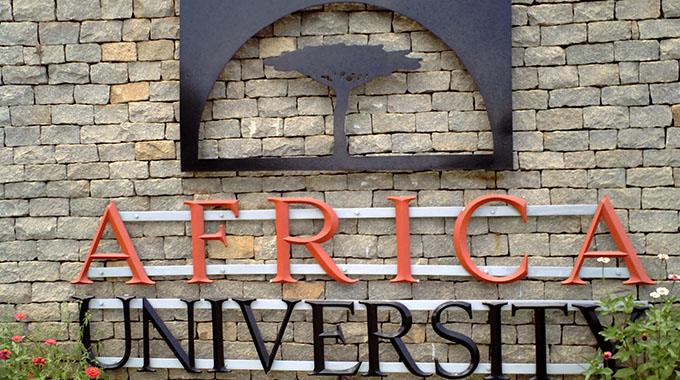Source: Agric revolution at Africa University | The Herald 22 AUG, 2019
Takunda Maodza in Penhalonga
UNIVERSITIES are responding positively to a call by Government to lead the economic turnaround, with Africa University embarking on a massive agricultural project encompassing crop production and animal husbandry.The Herald visited the university on Tuesday this week and toured its well-equipped 200-hectare farm.
It has centre pivots and uses new technologies to detect cows on heat. Part of the farm is under irrigated winter wheat (20 hectares) with the university’s farm manager, Mr Trevor Mupofu, telling The Herald they expect at least eight tonnes per hectare.
“We deliver our wheat to the Grain Marketing Board (GMB) every year,” he said.
The university also produces maize, soya beans, sugar beans and potatoes and supplies shops, schools and hotels in Mutare and surrounding areas.
Forty hectares are put under maize annually.
“We produce 10 tonnes of maize per hectare and again we deliver to GMB,” said Mr Mupofu.
The university also runs a poultry project comprising 6 000 layers and 10 000 broilers.
“We realise between 140 and 150 egg trays a day and each tray has 30 eggs translating to 4 500 eggs a day,” said Mr Mupofu.
The university also runs successful dairy and piggery projects.
The dairy project has 50 cows and each generates 18 litres of milk a day.
“On average we are doing 400 litres of milk a day. We add value to the milk by producing sour milk and yoghurts,” explained Mr Mupofu.
The university imported heifers from South Africa in 2015 response to a call by Government to increase milk production in the country.
“We are moved by the deficiency of milk in Zimbabwe which stands at about 70 million litres annually. It gives us the opportunity to expand our dairy project. Why should we as a country be importing milk products from South Africa?” asked Mr Mupofu.
“We do not keep bulls. We do artificial insemination. We partnered with Econet on heat detection on cows. The cows are fitted with smart collars on the neck. The smart collar has a sensor-like card which detects when it is on heat and sends the signal to our offices and we instantly do artificial insemination.”
Africa University Vice Chancellor Professor Munashe Furusa said the farm project was part of the university’s efforts to ensure food security for the nation.
“In terms of agriculture we do not just teach theory but we also teach the practice of agriculture. We teach students to produce. As a university the greater part of our food comes from our farm. We also produce our own sour milk, we produce yoghurt. We are value adding at a small scale but we plan to do bigger things going forward,” he said.
Prof Furusa said the university also joined Government’s Command Agriculture programme.
“In terms of complementing what Government is doing and in terms of food security and national sustainability you would be pleased to know that we were also part of Command Agriculture. We grow for the nation through Command Agriculture,” he said.
The farm is registered as a trust.
“We want it to be a productive unit which also offers training for our students. It is not just a university farm, it is a productive farm that offers training to our students,” said Prof Furusa.
Newer Post
US$24m boost for Cyclone Idai Older Post
Binga complains over high telecoms costs 
COMMENTS